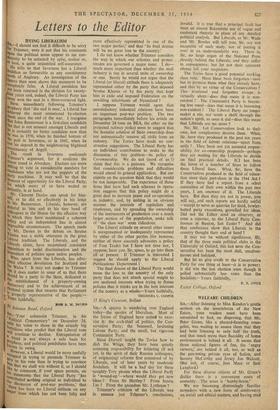- -Your columnist Trimmer, in his Z. 0 1 itica I Commentary' on
December 24, "049 his voice to those in the already big uattalions who predict that the Liberal vote :411 continue to decline. Extrapolation of
trend is not always a safe basis for noPheey, and political pendulums have been °wn to swing.
„..ticwever, a Liberal would be more usefully iTeupied in trying to persuade Trimmer to 'eve us his vote than in trying to convince lin that we shall win without it, so I should i,!‘c to comment, if your space permits, on ,73 statements that the Liberal Party • has tributed 'nothing original or individual to ,`". discussion of post-war problems,' that ti'Fre has been no Liberal attitude on any
more effectively represented in one of the two major parties,' and that ' its final demise will be no great loss to the country.'
I do not know whether Trimmer considers the way in which our colonies and protec- torates arc governed a major issue. I do— much more important than whether the steel industry is run in several units of ownership or one. Surely he would not argue that the Liberal (or liberal) attitude there is adequately represented either by the party that deposed Scretse Khama or by the party that kept him in exile and imposed Federation on the unwilling inhabitants of Nyasaland ?
I suppose Trimmer would agree that unsatisfactory industrial relations have been an important post-war problem. The two paragraphs immediately before his article on December 24 (one on BEA, the other on the projected railway strike) seem to suggest that the Socialist solution of State ownership does not automatically remove all strife from an industry. The Tories have made no con- structive suggestions. The Liberal Party has an individual contribution to make to the discussion of this problem—its policy of Co-ownership. We do not (most of us I) claim that this is a panacea. We recognise that considerable problems and difficulties would attend its general application. But our experts on the question think that they would be not insuperable. The experience of those firms that have had such schemes in opera- tion suggests that this policy might do a great deal to increase peace and co-operation in industry, and, by Uniting in an obvious manner the interests of capitalists and employees, and by spreading the ownership of the instruments of production over a much larger section of the population, make talk of ' the class war' seem ridiculous.
The Liberal attitude on several ether issues is unrepresented or inadequately represented by either of the other parties (for instance, neither of them sincerely advocates a policy of Free Trade) but I have not time nor, I suppose, have you, Sir, space, to go into them all at present. If Trimmer is interested I suggest he should apply to the Liberal Publications Department 1
The final demise of the Liberal Party would mean the loss to the country of the only party that does not attach special weight to any sectional interests when trying to frame policies that it thinks are in the best interests of the country as a whole.—Yours faithfully,
THEODORA C. COOPER
15 King's Crescent, Belfast


























 Previous page
Previous page